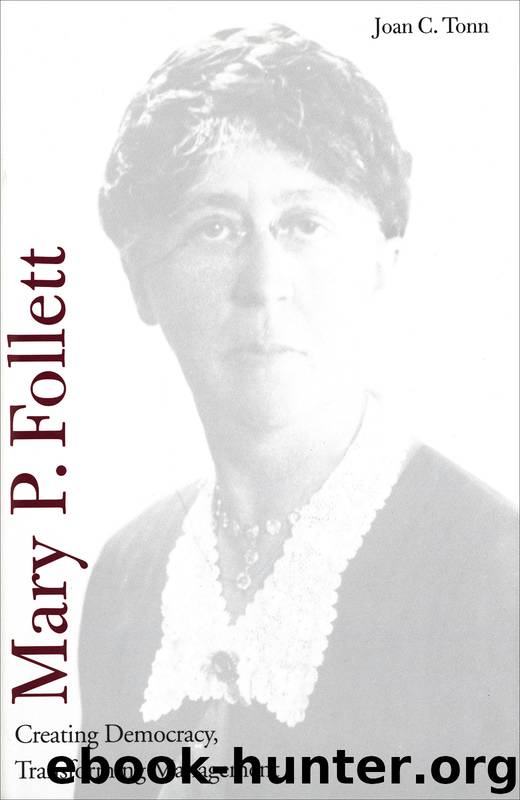Mary P. Follett by Joan C. Tonn

Author:Joan C. Tonn
Language: eng
Format: epub
Publisher: Yale University Press
Published: 2003-01-22T05:00:00+00:00
Still I think I won’t now give up this chance of regeneration for my soul, as you consider it! And are Pound and Laski, Tufts, Urban and Cohen all to be regenerated at one fell swoop? If you take a different six every year, it is only a question of arithmetic when the world will be saved.
Are all philosophers like you and Dr. Urban? And have I lived to this hoary age missing the best thing in life? If the meeting at Ithaca is at all as you and Dr. Urban describe it, I shall give up all other associates and humbly beg to spend the rest of my life with philosophers. I could sweep out the office or black boots, or something like that.
… Pay no attention to this letter. But do forgive my frivolity. I will try to murder it or hide it away before I enter the Presence in December.
Follett was quite taken with the philosophers’ strategy of pairing preconference publications with presentations, since this format suggested a deliberate attempt to foster “interpenetrations.” But upon reflection, thinking it more likely that the meeting would involve little more than the usual “give and take” of an academic conference, Follett thought it best to check with Harry Over-street about what her presentation should include: “Dr. Urban says it is to be this same paper which is coming out in the Philosophical Review with the ‘modifications’ which my reading of the other papers will entail!! (I had not imagined there was a whole association which so completely followed the true doctrine!) But unless you are all too good to be true I cannot quite believe this. Aren’t the December papers more likely to be in the nature of a rebuttal? Or is it understood that they are to be practically the same papers, and then that the discussion comes after the reading of the papers? In that case won’t the people who have already read them be bored to tears. Please let me know. I am not criticizing your methods. They have seemed to me particularly enlightened—this getting the material of the discussion before the members beforehand.”42
Follett’s suspicion that the meeting would center upon statements and rebuttals rather than “interpenetratings” and “unifyings” proved to be well founded. Even the published papers seem to consist largely of expressions of already-defined positions in the continuing monist-pluralist debate. Wilbur Urban, the primary proponent of monism, argued in his paper that the state was not omnipotent, that is, having ultimate authority in all things, but that it was omnicompetent, having the “final authority in certain things which concern all the elements of community.” Harold Laski, predictably, took a quite different view, arguing that the monistic state was not only an intellectual fiction but was also “administratively incomplete and ethically inadequate.” The defects of the monistic state could be remedied, Laski contended, only in a pluralistic state where coordination would replace hierarchical structure. Laski’s denial of the existence of “over-individual” or “communal minds” was seconded
Download
This site does not store any files on its server. We only index and link to content provided by other sites. Please contact the content providers to delete copyright contents if any and email us, we'll remove relevant links or contents immediately.
| Anthropology | Archaeology |
| Philosophy | Politics & Government |
| Social Sciences | Sociology |
| Women's Studies |
On the Front Line with the Women Who Fight Back by Stacey Dooley(4311)
The Lonely City by Olivia Laing(4120)
The Rules Do Not Apply by Ariel Levy(3905)
Bluets by Maggie Nelson(3710)
The Confidence Code by Katty Kay(3566)
Three Women by Lisa Taddeo(2920)
Inferior by Angela Saini(2831)
A Woman Makes a Plan by Maye Musk(2830)
Pledged by Alexandra Robbins(2790)
Not a Diet Book by James Smith(2726)
Confessions of a Video Vixen by Karrine Steffans(2674)
Nice Girls Don't Get the Corner Office by Lois P. Frankel(2594)
Wild Words from Wild Women by Stephens Autumn(2589)
Brave by Rose McGowan(2501)
The Girl in the Spider's Web: A Lisbeth Salander novel, continuing Stieg Larsson's Millennium Series by Lagercrantz David(2381)
The Clitoral Truth: The Secret World at Your Fingertips by Rebecca Chalker(2242)
Why I Am Not a Feminist by Jessa Crispin(2239)
Women & Power by Mary Beard(2224)
Women on Top by Nancy Friday(2121)
